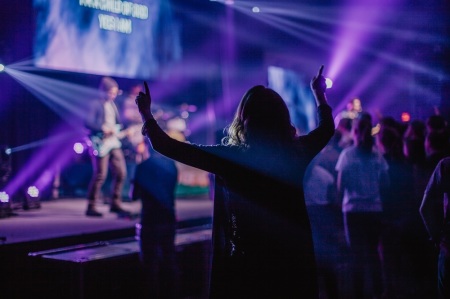Are churches a positive force in society? Republican, Democrat views widening

Are churches good or bad for America? The partisan gap on this question is widening, according to a new Pew survey.
Since 2017 the belief that religious groups and churches have a positive effect on how things are going in the country has dropped significantly, especially among Democrats, findings from Pew Research show.
Fifty percent of Democrats and Democrat-leaning respondents said churches had a positive effect on society two years ago; only 38 percent say the same today. Forty percent of Democrats say churches and religious groups impact society negatively. Thus, the 12-point drop on this question among Democrats has left them evenly split on the topic, a marked shift.
Among respondents who leaned or identified as Republicans, 68 percent said churches influenced the culture in a positive way in 2017, a slight decrease from the 73 percent who said so in 2017.
Taken together, 52 percent of Americans regard churches and religious organizations as positive, a drop from 59 percent from two years ago.
The now 30-point gap between the parties on the subject reflects stark partisan divide over the role of religion in American life.
Regarding the effect of colleges and universities on society, the Pew results were the inverse of the question about churches and religious organization.
Sixty-seven percent of Democrats said colleges and universities were a positive force in society. Only 33 percent of Republicans said likewise.
The survey was conducted last month and was comprised of 1,502 adults aged 18 and over from all 50 states and the District of Columbia.
The institution that received the lowest numbers from both Republicans and Democrats was the national news media. Thirty-eight percent of Democrat survey respondents said the media impacted society in a positive way. Only 10 percent of Republicans said the same.
The findings come on the heels of those from another in-depth survey that Pew conducted earlier this year on social trust and the reliability of all kinds of social and political institutions, the results of which were published July 22. The researchers found that approximately two-thirds of adults think Americans have little to no confidence in the federal government.
Among those surveyed with low degree of trust — the scale of which was determined by questions about people's general trust or distrust in others, their sense of the exploitative tendencies or fairness of others and their assessment of the overall helpfulness or selfishness of others — only 50 percent indicated that they had a great deal or fair amount of confidence that religious leaders would act in the best interest of the public.
"Partisan differences also show up in the levels of trust extended toward various kinds of leaders, including the military, religious leaders and business leaders (groups toward whom Republicans are more favorable than Democrats) as well as scientists, public school principals, college professors and journalists (groups that generally enjoy more confidence among Democrats than among Republicans)," Pew reported.





















